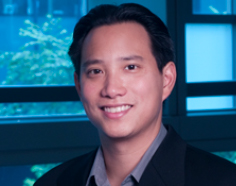
Optogenetic approaches to shaping intracellular signaling dynamics
Description
Our research group at the University of Pennsylvania studies and engineers photosensory proteins, which are complex machines that govern how all organisms adapt to a universal cue of light. In this talk, we will discuss the discovery of novel-effector photoreceptors and elucidation of their signaling roles and structure-function, (ii) their development as optogenetic tools for controlling cellular physiology with light, and (iii) the application of such tools in mammalian synthetic biology studies of cell signaling dynamics. Specifically, we will present the recent bioinformatics identification and biophysical characterization of a new class of fungal RGS-LOV photoreceptors that rapidly (~1 sec) localize to the plasma membrane through a blue light-switched, high-affinity, and direct electrostatic interaction with anionic membrane phospholipids; this finding is of significance because natural photoreceptors have not been previously known to signal by direct association with membrane lipids. As optogenetic tools, these LOV proteins are widely applicable as single-component systems for dynamic membrane recruitment to control the signaling of fused proteins, when expressed in diverse eukaryotic cell types and primary mammalian cells. We will also present the creation of optogenetic tools for bi-directional control (stimulation and suppression) of intracellular calcium release by Gaq-coupled GPCR signaling, and their application in engineered mammalian cell lines as calcium waveform generators useful for elucidating the principles by which cells encode and decode calcium oscillations in response to external stimuli.
Speaker Bio
Brian Y. Chow, Ph.D., is an Assistant Professor of Bioengineering at the University of Pennsylvania, where his laboratory invents new technologies to manipulate and monitor cellular physiology, and applies them to elucidating how cells compute. Prior to Penn, he was at Third Rock Ventures, a life sciences venture capital firm, and served on the founding management team of SAGE Therapeutics. He has also held engineering roles at IBM. Brian received his B.S. in Chemistry from Stanford University and his Ph.D. from the MIT Media Laboratory, where he also conducted his postdoctoral training, jointly with the Department of Biological Engineering and McGovern Institute for Brain Sciences.

